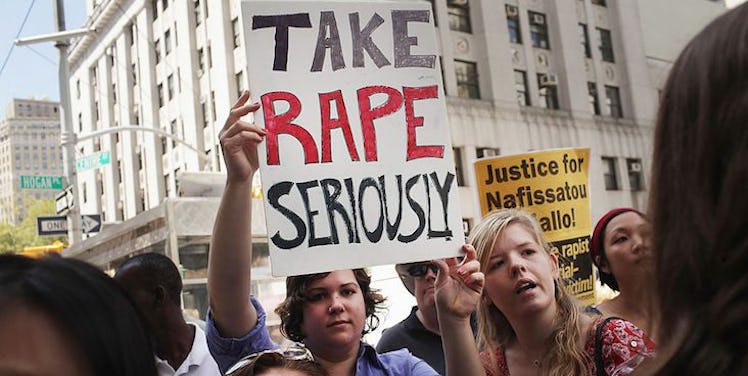
Reports Of Campus Sexual Assault Have Tripled, But Here's What That Really Means
Reports of sexual assaults on US college campuses have tripled over the past decade, according to a new federal study from the National Center for Education Statistics and the Justice Department.
The report offers valuable insight into a troubling issue that requires ongoing attention.
Reports of sexual assault at universities in the US jumped from 2,200 in 2001 to 6,700 in 2014.
While we should certainly be alarmed such crimes are occurring at all, this doesn't necessarily mean sexual assault is becoming more frequent on college campuses.
Lauren Musu-Gillette, who co-authored the study, explained to Elite Daily,
Data are available only for reported crimes, so the increase could reflect an actual increase in the number of forcible sex crimes, an increase in the number of people who report the crime when it occurs, or some combination of the two.
In an ideal world, we'd never see sexual assault occur -- especially in places of higher learning where young people should be able to feel safe.
Sadly, we are not there yet. We're far from it.
But, if more people are coming forward and reporting sexual assault, the increased number of reports is arguably a positive thing, as it means victims feel more comfortable seeking assistance and justice.
Alexandra Brodsky, co-founder of Know Your IX, which fights to end sexual and dating violence in schools, feels the new federal report is a strong sign students feel safer coming forward.
Speaking with Elite Daily via email, she said,
At this point, an increase in reported sexual assaults is almost surely evidence that survivors feel more comfortable speaking up. The schools we should worry about the most are those that receive zero reports; sexual assault happens at every school, and artificially low numbers suggest administrators haven't given survivors reason to trust them.
Past data has shown sexual assault is common on college campuses, but underreported.
Unfortunately, this seems to be true across the board.
Rape is the most underreported crime, and 63 percent of sexual assaults are not reported to police, according to the National Sexual Violence Resource Center.
When it comes to sexual assault, there's a well-documented culture of victim-blaming both on college campuses and beyond -- especially in the workplace.
Along these lines, as highlighted by Brodsky, many university administrations also haven't created an environment in which students feel supported enough to come forward and report when they're assaulted.
Hopefully, the increased number of reported sexual assaults means the culture is changing and victims now feel safer coming forward, which could aid education and prevention.
But the Trump administration could serve as a major setback in this regard, and advocates are concerned Education Secretary Betsy DeVos will not prioritize the issue of campus sexual assault.
DeVos recently hired Candice Jackson as deputy assistant secretary and acting assistant secretary of the Education Department's Office for Civil Rights (OCR), which is responsible for overseeing Title IX and sexual assault on campus.
Jackson has made troubling remarks on sexual assault in the past, as Refinery29 points out.
When a number of women came forward during the US presidential campaign and accused Donald Trump of assault, Jackson took to Facebook and referred to them as "fake victims" who were telling falsehoods for "political gain."
This is a textbook example of why many who've been sexually assaulted don't feel comfortable coming forward and reporting, because they're demonized in the process.
If victims are afraid they won't be believed, they are less likely to report.
With that said, concern over how DeVos will approach campus sexual assault appears justified, and it's important we all step forward to help combat this issue if the Trump administration is unwilling to.
Citations: Indicators of School Crime and Safety (NCES)